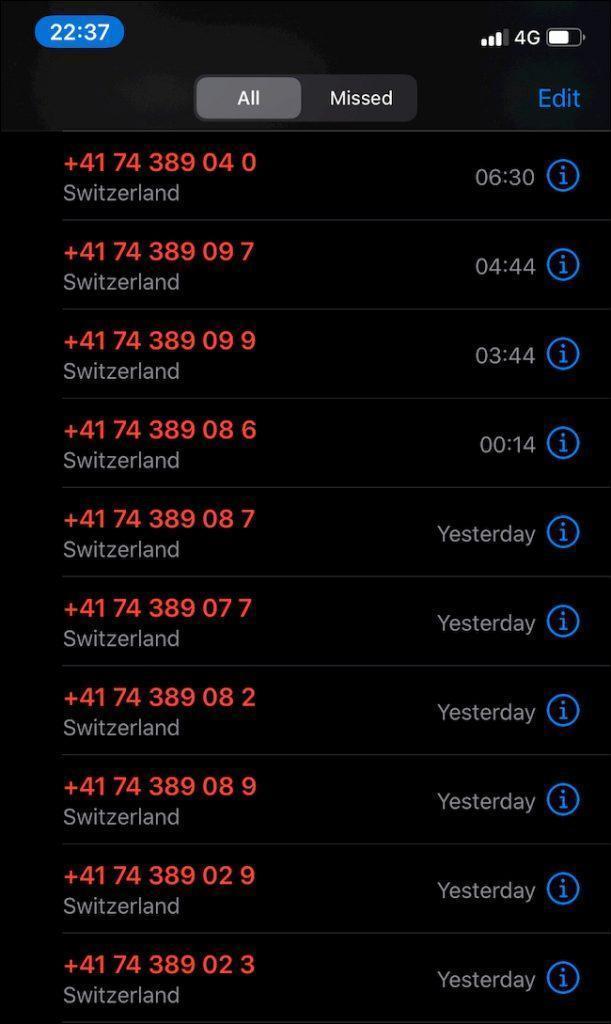If you happen to be called and hung up immediately then you have fallen victim to Wangiri, or at least they tried to deceive you with the method of one ring.

And suddenly a foreign number called your phone. And it's from a country you've never visited. And each time the calling digits change slightly, making it impossible to block them. They ring your phone once and then hang up. You're tempted to call them back, but you shouldn't, because this is all a phone call scam Wangiri and it will cost you dearly.
The Wangiri scam is based on your innate curiosity. Many people would instinctively call back, a missed call, even from a mysterious international number. And the recurring nature of fraud (it is not uncommon to receive dozens of missed calls in a day) adds to the intrigue and stress.

What if you succumb to the scam and call them back? Your call ends up with an expensive number charged. They will then force you to stay on the line for as long as possible. The longer you hold the line, the more money you will earn and the more you will lose.
To achieve this, fraudsters rely on a combination of sociology and psychology. Some victims said they were told they had won a prize, usually money, and were encouraged to wait in line to claim it. Others simply test the victim's patience by listening to waiting music without doing anything else.
The Wangiri scam comes from Japan. The term itself is Japanese and means "one (stroke) and cut". And as the name implies, it is a truly international scam, with victims being spread all over the world. Fraud warnings have occasionally been made to the media in the United Kingdom, Canada, Ireland and New Zealand, and other countries. In the USA, the FCC has warned consumers for this.
The usual tactic of Wangiri fraud is to call from a different country than the one called. Calls have been reported from developing African countries such as Mauritania, Liberia, the Comoros and Chad, as well as from tiny Pacific nations such as the Cook Islands and Nauru (population 10.756).
But do not think that the Wangiri scam does not exist even in the most advanced countries. In December 2019, thousands of UK residents were bombarded with fraudulent phone calls from Swiss phone numbers.
How to Protect Yourself
Ultimately, there is only one way to protect yourself from this scam and that is to avoid returning calls from numbers you don't recognize, especially international numbers. It is not unreasonable to assume that anyone urgently wishing to speak to you will have your number saved in their contact list so they can call you back, or leave a voicemail message or will send an sms.
You can also do something else. If you have been inundated with mysterious missed calls, you can Google these numbers to see if other people have suffered Wangiri from the same numbers, allowing you to confirm your suspicions that it is a scam.
If you end up with a huge number of blocked phone numbers with Wangiri calls, then consider changing your phone number and limiting who is calling you. Phone scammers often receive phone numbers from data leaks and marketing databases, which can be easily obtained through legal and illegal routes.
It is always a good idea to check your data at Troy Hunt's Have I Pwned to see if you have fallen victim of data breach. Once you recognize the situation, you can start taking protective measures.
Another sensible idea is to contact company your phone and ask them to put a limit on the amount of money you can spend each month. If you accidentally enter one of these Wangiri numbers, you will reduce your losses to a more convenient amount.
If you have already fallen victim
What can you do if the worst happens and you return a Wangiri call? In this case, call your phone provider and explain the situation. Some networks in some countries, such as Vodafone in the United Kingdom, will refund all charges made to a proven fraudulent number within thirty days.
You may also find that some networks do not have an express refund policy on scams Wangiri, they are likely to compensate the victims, in good faith. Of course, this depends entirely on how generous your phone provider feels, how good a customer you are, and perhaps your ability to convince them.
If they do not want to reimburse you, you may be allowed to split the cost of the call into installments, especially if you have an unusually large bill.
Finally, you should report your experience to the competent authorities, who can investigate.





